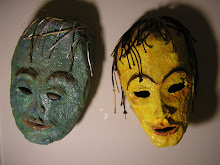I asked someone the other day if she watched Gilmore Girls and she said no then asked if I'd seen Desperate Housewives because she'd seen a bit and thought it was funny. I've seen a bit also and thought some of it was funny, but I wasn't motivated to try to watch more, because it's hard to understand a show with a continuing story if you haven't been watching, but also because there's a sense of meanness to the show that makes me uncomfortable. I had a similar problem with Seinfeld, particularly in its later years. People who saw the last episode complained about the meanness of the characters and situation.
I started to divide up shows into mean and nice ones. Some wouldn't fit into either category, but most would. People can do mean things in a nice show and nice things in a mean show. The difference between the two categories is that a nice show has as a basic world view that people should be nice. I think most shows before Seinfeld had this world view. Abandoning the "nice" viewpoint is part of what makes some shows edgy modern and fun, but when it's overdone it can make it not an enjoyable experience. Of course, I was raised in the 60's and 70's. Maybe mean shows aren't a problem with the 18-30's target audience.
Buffy the Vampire Slayer was a nice show because the group of friends in it were very caring and heroic, and when they did mean things to each other they felt bad about it. Gilmore Girls is a nice show although the main character in it can be breathtakingly selfish and self-centered. Her daughter approaches perfection, however, and is possibly the moral core of the show.
Arrested Development has the edginess of a mean show but uses the main character of Michael as a moral core, which keeps it mainly in the nice show category.
I had no interest in Survivor because its basic premise sounded so mean: people all competing against and backstabbing each other. Had it been groups of teams competing against each other, with the winning team to share the prize, I think I would have tuned in. Obviously, most of America doesn't have my hangups about that--I remember during that first Survivor series how people would converse assuming you watched it, not even first asking if you did.
Other reality shows can fall into either category. Sometimes mean and nice can be in the way a show is advertised. Dancing with the Stars is nice, because the emphasis is on the nice dancing. Skating with the Stars is mean because the emphasis was on the bruises and injuries occuring to neophytes taking a crash course in skating. Perhaps it even implied revenge on the "Stars" for not being normal and poor like us. If the advertising spots showing the injuries had a star saying "It's all worth it because this skating has been so much fun" then the show wouldn't be mean.
My problem with mean shows is that they don't provide the escape and feeling of relaxation, that I've escaped, afterwards, as does the fantasy life of a nice show. When I've finished battling vampires with Buffy, escaping the evil government of Firefly, or living the total romance-novel life of Rory Gilmore, I feel like I've been put into a different reality, one where people have good luck, and friends are true. Perhaps there needs to be a cosmic reward for being nice. Characters can be nice and good friends in Desperate Housewives, but there seems to be cosmic vengeance out to get them anyway. That makes the show mean.
In real life, although people do tend to respect the good, there doesn't seem to be a cosmic avenger out on either side, nice or mean. That's why we need fiction.
Subscribe to:
Post Comments (Atom)

No comments:
Post a Comment